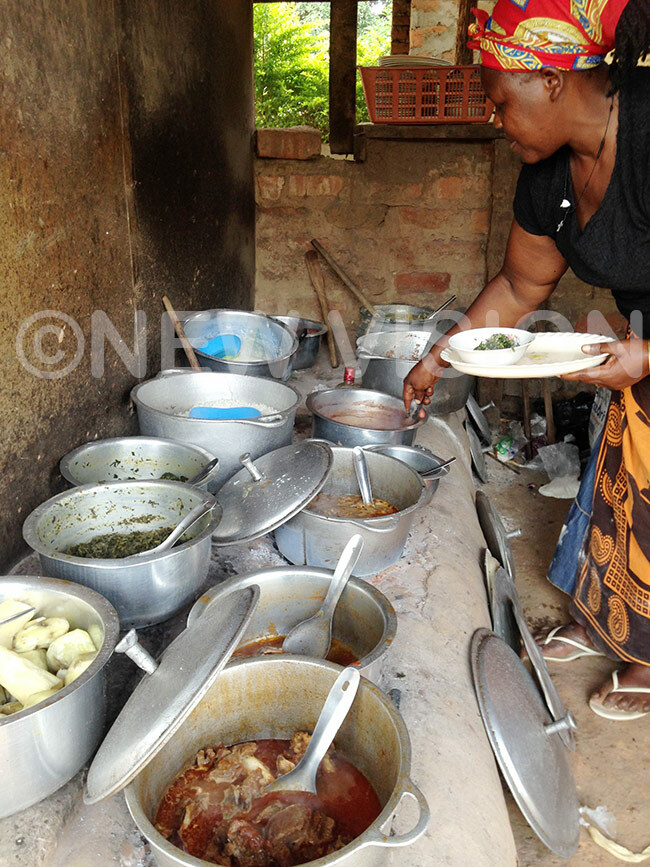Energy transition: Mama Opio's innovative improved cook stove
In Mama Opio’s scenario, three days are spent in search of fuel-wood in the riskiest of areas let alone preparing food for her household and the community in Gulu. Yet her innovativeness toward energy transitions and time are neither valued nor quantified.
By Ann Grace Apiita
It was one hot sunny afternoon when a colleague invited me to experience Acholi cultural buffet prepared in one of the most famous restaurants referred to as ‘Mama Opio's Open Kitchen'. Having lived and worked in Gulu town (northern Uganda) for three months, I welcomed this pleasant invitation.
As we walked towards this humble eating joint, I marveled at the various vehicles parked outside Mama Opio's kitchen and the long queue created by residents waiting patiently to be served. Our turn came, and I was stunned to see ten different traditional medium to small-sized saucepans containing diverse foods simmering on each stove.
Her food really looked delicious, but that was not all that met my eyes: ‘This is absolutely innovative of Mama Opio to modify a mud stove to cook ten types of food in one go!' I exclaimed loud enough for my colleague to say something in that regard. Still, I insisted and asked him what he thought about the stove.
"What matters is this piercing hunger I feel and all I want is food - simply food," he told me without hesitation. "For the many years I have eaten Mama Opio's food, I have never noticed her cook stove until today." As I listened to him in amazement, it was an innocent but upsetting response. Nevertheless, we enjoyed this traditional buffet.
The response I got from my colleague is an example of the many responses one gets from several households from sub-Saharan Africa. While we dream of a world where zero hunger prevails, most communities in East Africa are either blind or oblivious to the significant role that women play, not only in cultivating food but in energy transition. If women spent more of their time in productive activities, they would change their economic situation.
However, in Mama Opio's scenario, three days are spent in search of fuel-wood in the riskiest of areas let alone preparing food for her household and the community in Gulu. Yet her innovativeness toward energy transitions and time are neither valued nor quantified. Implying that most women who encounter similar circumstances still live in abject poverty today.

A huge burden falls on women and girls who spend eight hours of their productive time on domestic and unpaid care work daily, unlike men who spend only four hours according to the findings of the joint report published by Oxfam - Uganda and Uganda Women's Network (UWONET).
In addition, to appreciate food, perhaps a life cycle assessment of each food would help to increase knowledge of the population and the holistic development of sustainable energy in communities. This means considering the amount of energy, resources, tools and effort that goes into cooking, including the wastes generated from the process.
In that regard, Mama Opio's modification of the stove clearly demonstrates that technology transfer is a step in the right direction, but not convincing enough as some private sector actors would want local communities to believe.
Diverse technologies have been transferred to sub-Saharan Africa over the years as proven from numerous development reports, but the livelihood of the very poor have remained static. Therefore, if energy end users are not in position to socially ‘interact' with the technology to easily work with it, then civil society organizations are failing on service delivery to communities. For the sustainability of interventions such as mini-grids, improved cook stoves, biogas plants, boreholes - clean water plants in communities and others, the contribution of civil society is fundamental as proven from statistics of biomass and electricity consumption.
Furthermore, energy policies have not substantially taken into consideration the needs of women, yet they are the most vulnerable and neglected segments in society. No wonder when energy policies are formulated, and energy interventions implemented, the end-users of energy are technically excluded from governance issues within institutions and capacity building initiatives at the grassroots level mainly because of socially structured places for women in society.
Although increasing mini-grids and widening markets for renewable energy technologies have the potential to change the economic situation of energy end-users in communities, the comprehensive contribution of civil society organisations in building sustainable institutions, strengthening capacity needs of communities, changing mind-sets, mainstreaming gender-sensitive policies with more emphasis on women, justifies the relevance of GIZ implementing the Civil Society in Uganda Support Programme (CUSP) in the northern, central and eastern regions across Uganda with emphasis on strengthening capacity needs of civil society organisations, so that water, energy, agricultural and governance services are delivered effectively and sustainably in communities.
Although it is extensively known today that energy is important for economic development, communities will remain vulnerable to energy poverty and climate change impacts if institutional, organisational and individual capacity needs are not developed by civil society. Therefore, it is imperative that civil society organisations effectively participate in domestic policy processes, review policies and interventions that are blind to the needs of women and build capacity of rural communities who suffer adversely to meet their energy demands.
Vividly, civil society have a challenge to collaborate in integrating a spectrum of socio - economic and political capacity development initiatives that is inclusive if poverty is to be eradicated globally.
The writer is the Technical Advisor - Energy ,Civil Society in Uganda Support Programme (CUSP) GIZ Uganda